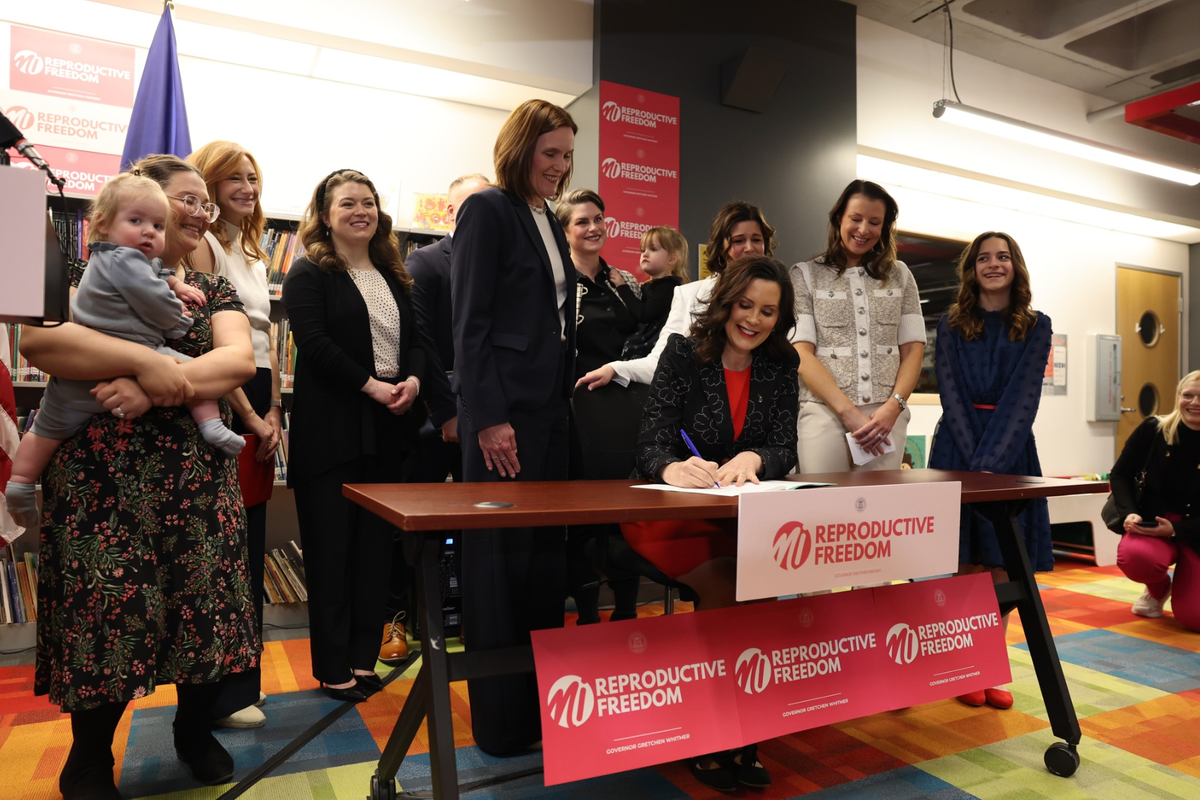‘I Never Set Out to Be An Advocate'
Surrogacy is once again legal in Michigan. With good old grassroots activism, here's how I helped make it happen.

A few months after my twins were born via surrogacy in 2018, I sat down with a former state legislator named Gretchen Whitmer. She was running for governor in my home state of Michigan and I was interviewing her.
After our interview we made small talk, as Midwest gals do. I explained that while I had grown up in Michigan, I was now based in London, but I was home for a few months waiting for my kids’ passports. I told her I had unexplained infertility, and though I had wanted to do surrogacy in Michigan, I ended up working with a surrogate based in Illinois, because of Michigan's antiquated 1988 Surrogate Parenting Act, which outlawed compensated surrogacy.
So draconian was the law in Michigan, that our contract with our Illinois surrogate specifically forbade her from going to Michigan from her second trimester onwards, because of the potential legal consequences if she gave birth early.
The U.S. is the world’s largest market for surrogacy. Although there’s no exact data for the number of babies born via gestational carriers, one 2014 study shows that gestational carriers were involved in about 3% of assisted reproduction cycles in the U.S. And while surrogacy (like all forms of reproduction) can be misused, for countless parents of children born to gestational surrogacy it’s a route to parenthood that feels nothing short of miraculous.
Michigan's History of Surrogacy
The ironic part is that Michigan played a pivotal role in the development of surrogacy: In the year 1986, it was where the first baby was born through gestational surrogacy, which means the surrogate is not genetically related to the child, and it was the first place in the world where the intended parents, and not the surrogate, had their names put on the birth certificate. But in 1988, all that changed when the state made compensated surrogacy a felony, punishable by fines and jail time. Having a contract with a surrogate also became illegal. Michigan became the first state to criminalise surrogacy, and it remained the last state where it was still against the law. Rates in Michigan had dropped to just a trickle of non-compensated surrogacy arrangements.
That changed earlier this month when, six years after my interview with Whitmer, the state of Michigan changed the law.
I never set out to be an advocate. In fact, I was skeptical that grassroots movements really ever moved the needle on things—until my work with the surrogacy advocacy group the Michigan Fertility Alliance (MFA).
In 2020, I was writing “Elusive Mommyhood”, my memoir-slash-journalistic deep dive into surrogacy, when I came across a Michigan woman named Stephanie Jones. A year earlier, Jones had founded the MFA from her hospital bed, having almost died, a second time, from an extremely rare form of ectopic pregnancy, which ruptured. She was told that if she wanted to have another genetic child (she already had a son), she would have to do surrogacy.
Jones had decided she wanted to change the law in Michigan, after she was forced to work with an out-of-state surrogate, about 380 miles away in Kentucky, who gave birth to her daughter in 2020. The law was not fair for families who could not afford to go out of state, she said. I interviewed Jones for my book, and we kept talking, almost daily, for months afterwards, until she finally asked me to become the communications and research director for the MFA, a volunteer role I still have.
Organizing Begins
Over the next two years we organized two state advocacy days, which included over 100 of our advocates talking to over 50 lawmakers from both sides of the aisle. We mobilized our advocates on letter writing campaigns, we took on interns and we networked with anyone who would talk to us about how to change state policies. At some point, it became clear to both of us that we were going to have to craft a new law.
I had made several connections while writing my book, including Karla Torres, the senior human rights counsel at the Center for Reproductive Rights. She reached out in December 2022, after Michigan became one of the first states to enshrine abortion rights rights into its constitution.
Michigan Democrats had also, for the first time in four decades, won control of both the House and Senate. And Whitmer, a Democrat, was now the governor. This political trifecta made it the right time to move legislation forward, especially as we had a bill sponsor, Rep. Sam Steckloff, who had a personal connection to surrogacy. As a breast cancer survivor, it was likely the only way she could grow her family: Cancer patients are often told to wait up to five years after treatment to get pregnant because cancer can be hormone-sensitive.
“Everyone had a role. We clocked up hundreds of hours working on the bill.”
Karla, Stephanie and I formed a coalition of some of the nation’s top legal minds and law professors in the space. Everyone had a role. We clocked up hundreds of hours working on the bill.
In October 2023, the Michigan Family Protection Act (MFPA) was introduced in the House. I flew in for hearings—missing Halloween with my kids in London—then, in mid-November from London, I watched the livestream as the bill passed on the House floor. (Not a single Republican voted for our bill.)
In early March 2024, I trekked back to Michigan for hearings on the bill in the Senate. Stephanie and I stayed up late editing the testimonials of our advocates and crafting our messaging to counter-argue things we knew our opponents would try to throw at us. A week later, with me back in London, Stephanie and I watched over FaceTime as our bill passed on the Senate floor. (This time, two Senate Republicans voted for it, including my state senator.)
'Big, Fat, Ugly Tears'
We cried big, fat, ugly tears. It’s hard to explain what the moment felt like: We had truly helped to change the law. Relief, release, happiness, incredulity, shock, bitterness, sadness—an emotional rollercoaster of feelings pouring out of me in loud, heaving sobs. My son and daughter hugged me. While their 6-year-old minds didn’t really get it, they understood that it vaguely had something to do with them.
A few weeks later, in the basement of a library in suburban Detroit, I watched Gov. Whitmer sign the MFPA into law. And earlier this month, it went into effect. The bill not only legalizes surrogacy contracts and compensation, but it also has a parentage component, so children born in Michigan through assisted reproduction (including surrogacy, of course—but also IVF, gamete donation, etc.) are now legally tied to their parents from birth. For lesbian couples, this means they don’t have to go through the complicated and time-consuming second parent adoption process.
Gov. Whitmer, as she headed out of the room, leaned over to me as I was feverishly trying to get the MFA’s newsletter out. “Thanks for all the hard work you did on this bill,” she said with a red-lipsticked smile.
We had done exactly what we had talked about all those years before.











